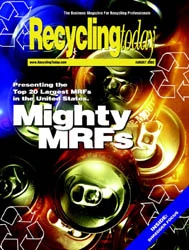Baltimore County Receives Award
The Maryland Recyclers’ Coalition has honored the Baltimore County Bureau of Solid Waste for its public outreach campaign in the county’s elementary schools with its Outstanding Government Leadership Award.
The Bureau designed an interactive program to involve and inform students in 45 Baltimore County elementary schools about the county’s recycling program. The Bureau developed 45-minute presentations for students in kindergarten through third grade that include an original story, "Michael Won’t Recycle." Lea Jones, a 1997 intern from Towson State University, wrote the story, which was illustrated by Asha Wijetijnge, a 1997 intern from University of Maryland. An interactive game and question and answer session also are part of the program, which emphasizes waste prevention methods, such as reducing waste and reusing items.
Laura Norman, the Bureau’s public information specialist, coordinated scheduling with the schools. Norman or Clyde Trombetti or Joe Pistorio, also public information specialists with the Bureau, gave the presentations.
Deposit Legislation Introduced in Ontario
In June, Mike Colle, an Ontario legislator for the Greater Toronto Area, introduced Bill 125, which amends the Liquor Control Act and requires the Liquor Control Board of Ontario (LCBO) to institute a deposit and return recycling program for the bottles and cans it sells.
According to the bill, the LCBO Deposit and Return Act will ensure that "all liquor sold to the public on or after July 1, 2003 by government stores and stores owned and operated by wineries or manufacturers of beer or spirits is in containers for which a deposit is charged at the time of sale and refunded on the return of the container."
RE-News, an electronic news bulletin from the Recycling Council of Ontario quotes Colle as saying, "It’s time for the LCBO to take responsibility for the costs borne by municipalities to collect and recycle the massive amount of glass containers sold every year in Ontario. It’s also time to correct the double standard that exists in Ontario today where beer retailers shoulder the cost of a deposit return system but Ontario’s monopoly liquor retailer does not."
As glass consuming markets have diminished , much of Ontario’s glass has ended up in landfills, according to Re-News.
Amarillo Discontinues Glass Collection
Glass container collection was discontinued from curbside collections in Amarillo, Texas, in July.
The decision to halt the collection of glass in Amarillo follows a trend in much of the country. With end markets for the collected glass dwindling, municipalities in some regions find it difficult to continue taking in small amounts of the material when they have to ship the collected glass great distances.
According to a spokeswoman for Amarillo’s Public Works Department, the city collected roughly 79,000 pounds of glass in the last fiscal year.
While the city will continue to look for end markets for glass, it appears likely the decision to halt glass collection is permanent.
Massachusetts Fines City for Tossing Recyclables

According to a report in the Boston Globe, a settlement announced by the state attorney general’s office states the city of Wayland, Mass., violated state environmental law by burying plastic bottles instead of recycling them.
Under the settlement, Wayland has agreed to pay a $25,000 civil penalty, $10,000 of which will be waived provided the town doesn’t violate the regulation again within the next two years.
According to the Boston Globe, the case began in 1999 when the state Environmental Strike Force followed up on tips it received about recyclables being buried in the town’s landfill.
The Boston Globe reports that Wayland officials say they agreed to the settlement to avoid a long legal battle and maintain that the town did nothing wrong, that the plastic containers in question where thought to be contaminated and therefore thrown out.
"We in Wayland take recycling very seriously, and I think that staff at the landfill does as well. We certainly would not do anything blatant," Board of Selectmen chairperson Mary Antes says. She adds that the grand jury investigating the matter did not produce any criminal indictments.
The Boston Globe quotes Iris Vicencio-Garaygay, an environmental advocate for the Massachusetts Public Interest Research Group, as saying, "The great thing about what happened in Wayland is there does need to be some enforcement going on in terms of recycling going into landfills. What’s unfortunate about this is that it might confirm some people’s fears. But if the attorney general’s office is taking action against it, and [if] the potential exists for more enforcement action to happen, that can only be a good thing."
Massachusetts Department of Environmental Protection spokesman Edmund Coletta says that enforcement will certainly take place in the future as the state moves toward its goal of recycling 70 percent of its solid waste by 2010.

Explore the August 2002 Issue
Check out more from this issue and find your next story to read.
Latest from Recycling Today
- Athens Services terminates contract with San Marino, California
- Partners develop specialty response vehicles for LIB fires
- Sonoco cites OCC shortage for price hike in Europe
- British Steel mill’s future up in the air
- Tomra applies GAINnext AI technology to upgrade wrought aluminum scrap
- Redwood Materials partners with Isuzu Commercial Truck
- The push for more supply
- ReMA PSI Chapter adds 7 members





